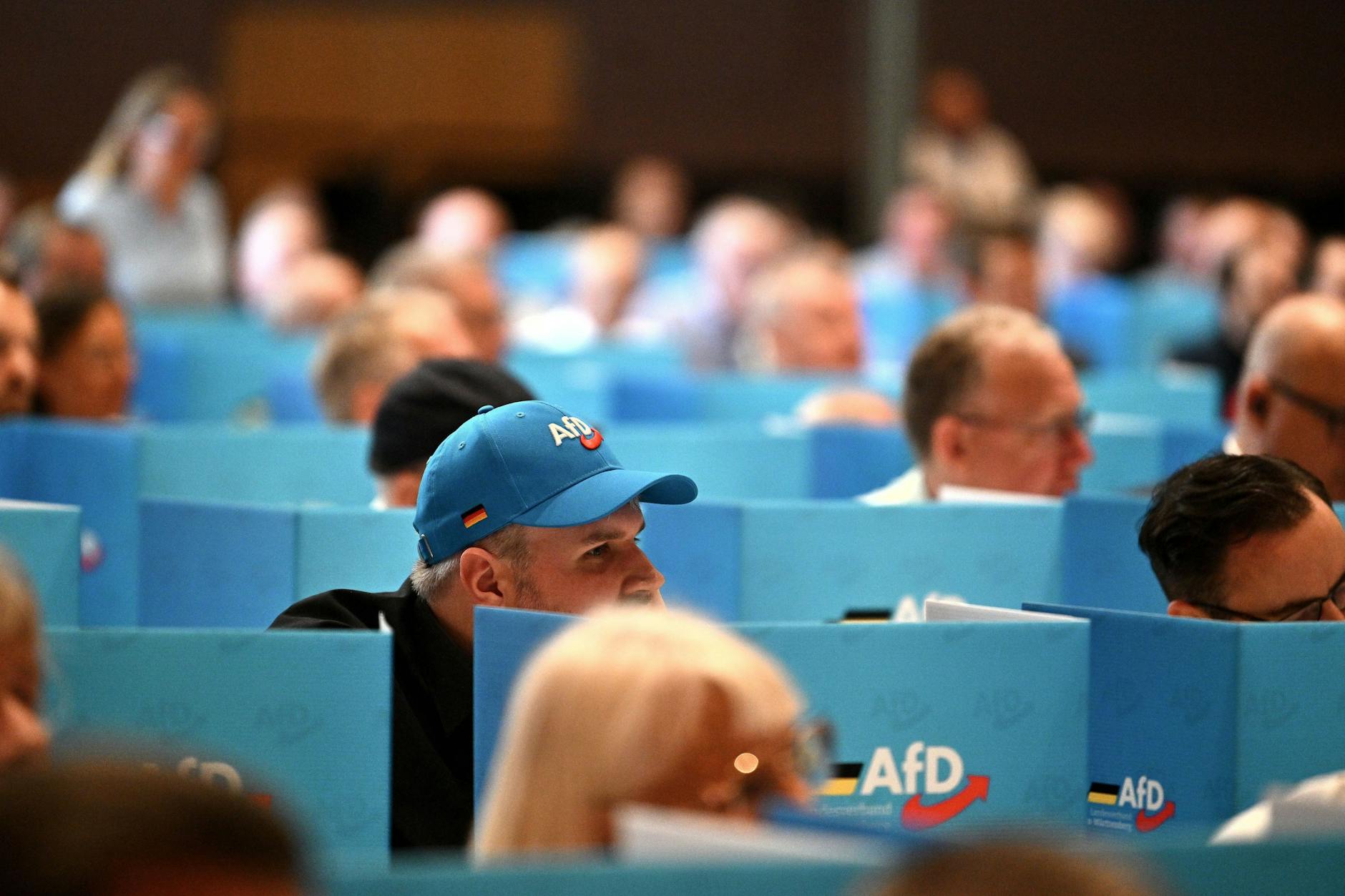The AfD in a self-experiment: The political opponent should not be grilled, but cooked

Provocation is their principle, breaking taboos their tool. With this strategy, the AfD has maneuvered itself into the center of the debate. Where others saw red lines, the AfD saw an opportunity to raise its profile. But the mechanics of political turmoil seem to have faltered. After soaring high in the federal election campaign and achieving the best result in their history, the self-proclaimed critics of the system have fallen silent. A rare moment that their political opponents were able to exploit.
First, the Federal Office for the Protection of the Constitution classified the AfD as confirmed right-wing extremist, then the corresponding report was published, and most recently, the SPD agreed to prepare proceedings to ban the AfD. To make matters worse, a dispute has erupted over the slogan "remigration," which appears to be driving a wedge between parts of the party and its right-wing wing.
Now the party is wrestling with a new strategy. The appropriate slogan has already been found: moderation. But for a party whose rise, especially in East Germany, was based on radicalism and a clear demarcation from the "old parties," an abrupt change of course is risky: How can the tone be civilized without losing its own base? Or is moderation, at the end of the day, just the next move in a game with a double bottom?
“The AfD has removed remigration from its policy platform”Last weekend, events unfolded rapidly. Things became hectic in a chat group of the AfD parliamentary group on the messaging service Telegram. "The AfD has removed the terms remigration and German Leitkultur from its policy platform," it said. Head-shaking emojis followed in response to what the Bundestag parliamentary group had rumored to have decided at its closed meeting, which was still in full swing at the time. Was this true, or was the "political opponent" trying to stir up trouble?
Shortly thereafter, the mainstream media also reported on the matter. The Bild newspaper ran the headline: "Fighting term deleted! AfD separates itself from 'German Leitkultur'." Members of various chat groups found it hard to believe. Disbelief spread, which turned into relief by the evening. "It was apparently a 'working paper'. That's good news, but it also shows that there are still currents within the AfD that view pandering to the CDU as a suitable strategy," one user wrote.
A sentence that, in view of the change in strategy that the Alternative for Germany is implementing, initially slowly but now with increasing speed, reveals a dilemma: Anyone who has relied on confrontation for years cannot easily move closer to the political center without losing credibility and sacrificing part of their base.
The shift from riot to moderation was already underway in March, when co-party leader Tino Chrupalla announced that his party would adopt a moderate tone in the coming legislative period. The debate surrounding "remigration," initiated by Maximilian Krah, marked the next step, but it met with significantly more opposition within his own camp.

In June, Maximilian Krah sounded the alarm in a conversation with right-wing publisher Götz Kubitschek. Facing the threat of a party ban, he advocated dropping the term "remigration," even though he himself had contributed significantly to its dissemination. A course correction that was viewed by right-wingers as "crossing red lines." Concerns are growing that the party could gradually become the next "old party"—adapted, gutted, and stripped of its original agenda.
Hours pass, and chat groups quiet down. In the final press conference, the two party leaders, Alice Weidel and Tino Chrupalla, emphasize that the party's guidelines remain unchanged.
What does the AfD really want?There is a clear definition of remigration, which the party continues to adhere to: "Remigration encompasses all measures and incentives for the constitutional and lawful repatriation of foreigners required to leave the country to their homeland. The AfD does not differentiate between German citizens with and without a migration background." The party has adhered to this definition since 2024.
So everything remains the same, and the reporting on an adopted code of conduct and the aforementioned change in strategy is just as wrong as the deletion of two key terms?
As the media debate gathers momentum, the news portal Politico publishes an internal document intended to nip all strategy speculation in the bud. Titled "Faction Retreat: Introduction of the Strategy Process," it delivers on its promise. On 55 pages, it lays bare the short-, medium-, and long-term strategy of the Alternative for Germany (AfD) based on a detailed analysis of the political situation and the recent federal election.
Officially, the paper is only an individual initiative by Beatrix von Storch – but in fact, it sums up what a growing part of the AfD is strategically striving for: distancing itself from the nationalist camp and joining the “political mainstream.”

The first page of the presentation already demonstrates what this new strategic thinking looks like in concrete terms. True to the motto "After the election is before the election," ambitious goals are formulated: "Tap into new potential, expand the environment of acceptance, tear down the firewall, assume government responsibility." A photo of the Federal Chancellery adorns the left column of the document. Why remain modest when power seems within reach?
But the following pages, peppered with diagrams and graphs, clearly demonstrate how far this claim is from reality. According to an "Insa Potential Analysis" published just under a month ago, 56 percent of the population "basically cannot imagine voting for the AfD." Another diagram refers to a survey by Infratest dimap. According to this survey, 68 percent of eligible voters continue to oppose AfD participation in government.
Instead of fiery speeches, they want to focus on seriousness and controlAt the same time, the paper documents a shift in sentiment in the debate about banning the party. While in January a majority had spoken out against banning the party, in May 2025 – after the publication of the Federal Office for the Protection of the Constitution's report – a survey by the Research Group Wahlen showed a relative majority of 48 percent in favor of a ban. Only 37 percent consider a ban on the AfD to be the wrong approach.
For the parliamentary group, this is a clear signal that the debate surrounding such a procedure will not be fueled by new arguments. Instead of fiery speeches in the Bundestag, the focus in the future will be on seriousness and control.
To ensure clarity on what this means, Stephan Brandner, deputy federal spokesperson for the AfD, presented a paper at the parliamentary group meeting: "Principles for conduct during plenary sessions." The internal code of conduct is to be understood as a kind of guideline that all members of parliament are to adhere to from now on.
The political opponents are not to be grilled, but boiled. And at some point, at least according to the plan, the Union should reach a stage of maturity where the Christian Democrats will agree to cooperate.
The aim is to force the CDU into a strategic defensiveThe verbal tactics also include a deliberate shift in the balance of power. The "divergence between the CDU/CSU and the SPD must be made irreconcilable" so that the rifts deepen and "cross-party coalitions" are prevented, according to von Storch's presentation. The AfD is supposed to appropriate classic CDU/CSU issues—economy, energy, and finance—in order to increase the "pressure." The goal is to force the CDU onto a strategic defensive, both in terms of content and power politics.
The CDU is to become a pawn, and the Alternative for Germany (AfD) is to set the pace. To make this vision a reality, to transform the castle in the air into the realm of the Chancellor's Office, the AfD aims to optimize its voter potential. Since its founding, the party has been particularly successful in mobilizing non-voters.

In the last federal election, the proportion of non-voters who cast their ballot for the AfD for the first time was 33 percent. This voter base, on which the AfD has long relied, is in danger of drying up. Since 2013, it has siphoned off a large portion of the non-voter potential for itself. In this area, too, the party intends to correct course and focus on four voter groups: women, baby boomers, Germans with a migration background, and religiously affiliated Christians.
But what does all this mean? The strategy seems clear and yet uncertain. The AfD parliamentary group is taking the lead, while the eastern German state associations are retreating. While Thuringia remains unwaveringly committed to "remigration" as its core programmatic theme, the Berlin state association supports the new course. The Brandenburg AfD, on the other hand, also clings to its old riotous style, resulting in the party's inconsistent, and in some parts even contradictory, actions.
Some see it as a historic moment, others as a betrayalBut the federal parliamentary group is doing its thing, because the new course is more than just a rhetorical adjustment. It's an attempt to replace the mode of outrage with one of power. At any price? A rift is already opening between strategic moderation and ideological roots, rippling through the party and its supporters. Some sense a historic moment, others a betrayal.
The party leadership is still managing the balancing act. The double bottom is not yet recognizable as a trap. But the question remains: How long can a party stay together when its base is geared toward confrontation while its leadership is eyeing coalition capability? Moderation may be tactically astute, but without credibility it remains a futile maneuver. The change in strategy initiated after the federal election is in full swing and is the clearest attempt yet to return the AfD to political normalcy. True to the motto: "Germany, but normal." The AfD seems to have decided that it must become more like today's Germany if it wants to have a say in what is normal.
Berliner-zeitung





